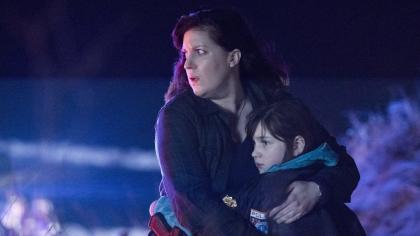Upfronts 2019: Mega TV Studio & Indie Network Debut, ‘Emergence’ Switches Nets, Expanded Stacking Rights & Flexible Episode Orders

The upfront pageantry this year was as strong as ever — live performances by Jonas Brothers, John Meyer and Luis Fonsi, cocktails at the Plaza — as the top commercial networks vie for a piece of the $20 billion TV advertising pie.
Yet, the glitzy presentations sometimes were overshadowed within the networks’ own companies. The upfront event of Disney’s ad-supported networks followed the more heavily hyped and equally elaborate unveiling of the upcoming Disney+ SVOD platform last month.
Related stories
Upfront Week 2019: The Good, The Bad & The
Maybe anticipating the seismic changes coming with the number of high-profile streaming platforms set to launch in the next year, the broadcast networks played it safe, betting on more returning series and only introducing a couple of new shows in the fall. After the bloodbath last May when a slew of fan favorites were canceled, including Lucifer and Brooklyn Nine-Nine, the five broadcast networks next season will be returning at least 71 scripted series from this season vs. 64 last year.
In the 2019 new series orders, there was more cross-pollination from last year, which had marked a peak in vertical integration.
In 2018, out of NBC’s seven new series, only one came from an outside studio, Warner Bros. TV’s Manifest, which became a co-production with Uni TV. This year, out of eight new series, half come from three different outside studios (NBC again has ownership in all). On the NBC upfronts call Sunday, NBC Entertainment co-chairman Paul Telegdy called working with outside suppliers “an integral part” of the network’s success.

Meanwhile, NBC sibling Universal TV became the first studio in years to land at least one new series on all of the Big 4 networks in the same year: drama Not Just Me and animated comedy Duncanville on Fox, drama FBI: Most Wanted on CBS, The Baker and the Beauty on ABC as well as dramas Council of Dads, Bluff City Law and Lincoln (co-production) and comedies The Kenan Show and Sunnyside at NBC.
The lines of vertical integration in TV were redrawn in a big way this year by Disney’s $71.3 billion acquisition of 21st Century Fox assets. It created a massive TV studio operation in Disney TV Studios, comprising 20th Century Fox TV, ABC Studios and Fox 21 TV Studios.

As expected, Disney TV studios delivered a dominant performance in its first upfront as a collective, landing the most new scripted series of any studio (14), including 20th TV’s 9-1-1 spinoff 9-1-1: Lone Star at Fox and ABC’s black-ish spinoff mixed-ish at ABC. It also topped the list for the most series overall (38) on all major broadcast networks. There was some inertia from years of close integration, with the bulk of 20th TV’s new business coming from former corporate sibling Fox and all of ABC Studios’ new orders coming from ABC, but Disney TV Studios President Craig Hunegs stressed: “We are really just getting started. Our results already demonstrate the scope and power of our studios.”

The Disney-21st Century Fox deal also created the first independent major broadcast network in decades. “Startup” Fox still is searching for its identity as it looks for the right mix of entertainment and sports, but it presented a new drama slate from such top auspices as Ryan Murphy, Greg Berlanti, Tate Taylor, Jason Katims and David Ayer, picking up series from four different studios. (All are co-productions with Fox Entertainment.)

One of the most intriguing stories involving vertically integrated networks this upfront involved supernatural drama Emergence. The project from Michele Fazekas, Tara Butters and ABC Studios, originated as an NBC pilot. Well-liked by ABC Studios brass and the higher-ups overseeing the studio operation, including Dana Walden, Emergence did not come into play until well into the final week before the upfronts, when chatter started that NBC was not going to pick it up.
“We had an abundance of choices,” NBC’s Paul Telegdy said when asked why the network passed on Emergence. I hear the decision might have related to NBC’s similar high-concept drama Manifest. The two share some DNA in mythology and sci-fi elements; the Emergence pilot even has a plane too. Both Manifest and Emergence are considered very strong pilots. Because of how red-hot Manifest started and how quickly it faded because a dense, high-concept story is harder to sustain, I hear NBC executives might have been wary of repeating that with Emergence. Manifest still has done respectable numbers when delayed and digital viewing is factored in, earning a Season 2 renewal. It has been held for midseason.
For ABC, which has been focused on reclaiming the No. 1 spot with women, the setup of Emergence — a sheriff (Allison Tolman) taking in a young girl — was appealing. I hear the network and ABC Studios felt they could turn the high concept into an ongoing series and went after the pilot. Everyone I spoke with praised NBC chiefs Telegdy and George Cheeks for not standing in the way of ABC picking up the pilot to series, which NBC could have done.

I hear there were some other incentives too. 20th Century Fox TV had a strong comedy pilot at NBC, Perfect Harmony, which had not been picked up to series. The network had come in with an ask on the distribution side, and increased ownership. (NBC is known for requesting co-production on series whose pilots had been solely deficit financed by an outside studio, which I hear happened again this year too on comedies.) Additionally, Universal TV’s dramedy pilot The Baker and the Beauty was under consideration at ABC.

There was a lot of back-and-forth, some concessions and old-fashioned horse trading. In the end, Perfect Harmony and Emergence landed on the fall schedules of NBC and ABC, respectively, and The Baker and the Beauty scored a series pickup at ABC as a co-production between Uni TV and ABC Studios. It was a win-win situation except for WBTV’s ABC bubble series Whiskey Cavalier, which I hear lost its spot when the network picked up Emergence and eventually was canceled after one season.
As has been the case the past few years, digital rights again were a major part of pickup negotiations with outside studios this upfront. I hear there was a new wrinkle in 2019 triggered by the upcoming launch of Disney+ and Comcast’s yet-unnamed streaming platform as well as Disney’s taking full control of Hulu. I hear this year ABC and NBC pushed for full in-season stacking rights to new series that include the new streaming services. Additionally, I hear some networks this year have demanded extended in-season stacking rights that stretch all the way to September.
Upfronts 2019: An Englishman In New York On The Long, Strange Trip To The Network Parade
Maybe because it now is unavoidable, studio heads I’ve spoken with this past week didn’t gripe about in-season stacking rights as much as they did when the concept first was introduced. (It involves a network putting all episodes of a series’ current season on the net’s digital platforms.) Initially, studios were concerned that having a series exposed on streaming platforms in-season would undermine their prospects for SVOD library sale of complete seasons.
As one exec put it: “A valuable series is a successful series. If exposure on digital platforms helps draw viewers in and keep a show on the air longer, its value goes up.”
I hear one of the issues with in-season stacking rights this year was tied to the concept of, “flexible episode orders,” as Telegdy called them.
“For as long as I’ve understood American network television, people have talked about order numbers of 13 with a back nine,” the British native said Sunday. “We’re looking at it in terms of a far more flexible way that deals with the creative proposition.”
He would not elaborate, but by surveying sources, I hear that — besides 22-, 13- and the now-ubiquitous 18-episode seasons — there are a slew of 10-episode and some 8-episode orders at ABC, NBC and Fox this year, and there even are some even more unconventional order sizes, like 12 episodes.
A lot of that stems from networks’ push to stay in originals year-round. When a series goes on hiatus, it opens a gap on the schedule that you need a particular number of episodes to bridge.
I hear the shorter orders are prompting studios to ask for shorter/less restrictive in-season stacking rights, something networks have not been willing to do. If we look at an eight-episode season, traditional in-season stacking window would almost resemble the library window, possibly giving the network access to the season for months after it had aired, with little tune-in benefit.
Sign up for Deadline's Newsletter. For the latest news, follow us on Facebook, Twitter, and Instagram.

